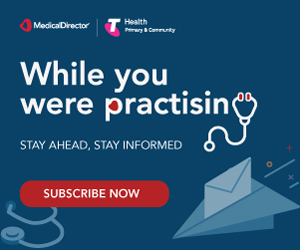Health anxiety, Doctor Google and a generation of ‘worried well’
The impact of Doctor Google on self-managing and interpreting health conditions is creating a growing community of ‘worried well’ across Australia. MedicalDirector’s recent report, Dr Google, How Self-Diagnosis Impacts Clinical Care, reveals how Doctor Google is playing tricks with our mind and influencing our anxieties and attitudes about our own health.
The research, which recently gained significant media coverage, including being featured on Channel Ten, Channel Seven, Sky News, Sunrise, The Daily Telegraph and A Current Affair, found a majority (60%) of Australians said they were convinced they had a certain illness after Googling symptoms, only to find out later it was something else.
“What really concerns me is patients going to non- reputable sites to obtain information that is not evidence-based and quite possibly false, and the potential dangers of a patient then trying to treat themselves before seeing a practitioner,” says GP and Chief Clinical Advisor at MedicalDirector, Dr Charlotte Middleton. “Not to mention, there can be significant adverse effects on mental health if patients believe they have serious illnesses when they actually don’t. So, be willing to have a chat with your health practitioner, and don’t take the risk of trying to self- diagnose, self-medicate or self-treat. “
Health anxiety v fearing the worst
Alarmingly, the research revealed more than a third of Australians (38%) have become convinced they have a life-threatening or terminal illness after Googling their symptoms.
“I recently treated a patient who had a bacterial infection that was easily treatable with antibiotics, and I continued to see her weekly until she was better,” Dr Middleton says. “But during that time, she was Googling every single one of her symptoms, and every week she was visiting me saying, ‘I think I’m dying and that I have cancer, because that’s what Google told me.’”
“In the same breath, she would also say, I know I need to stop Googling, but I can’t stop myself.’ Now, she was a very intelligent woman, but her Doctor Google habit was so bad it kept increasing her health anxiety, to the point her partner actually took over and banned time on the computer.”
The research revealed people are the most stressed about their health and wellbeing when it comes to finding out they have a serious illness or condition (33%), followed by the fear of not having all the information they want about their health (19%).
“This cannot be a healthy or productive state of mind to be in, it’s awful to think that there are individuals going about their day in fear that they are suffering from a life-threatening or terminal illness, all because they chose to Google their symptoms rather than consult a health practitioner,” Dr Middleton says.
The dangerous era of digital hypochondria
There’s reason to speculate a correlation between an individual’s mental health and productivity, and Googling medical symptoms. There’s every possibility the Internet is contributing to a social ecosystem of hypochondria.
For instance, what Dr Middleton found interesting is that her patient couldn’t stop deliberately searching terms that would confirm her worst fear about her health.
“That’s what concerns me the most as a doctor – that people are tailoring their search terms to what they fear will be the worst possible health outcome, which could be something quite sinister,” she adds. “And it prevents them from getting a clear or balanced view of what their symptoms actually are.”
“In the vast majority of patients, it’s not a sinister diagnosis and is easily treatable or preventable.”
While it is normal to become worried about one’s health from time to time, health anxiety is a serious issue, and one which Health Direct notes is directly linked to the triggering activity of “reading about diseases on the Internet.”
Searching for health info isn’t bad, so long as it’s contextualised
It’s important to note that being proactive about one’s health and searching for answers is not a bad thing. In fact, a recent study published in the Medical Journal of Australia found consulting ‘Dr Google’ before presenting at the emergency department could improve interactions between patients and their treating physician.
However, it is the quality and scope of information that comes up in a search, and how that information is processed by a worried patient, that we need to be mindful of in the age of Doctor Google.
“I don’t have an issue at all about people proactively seeking out information about their health and empowering themselves with knowledge,” Dr Middleton explains. “But if it’s only going to increase your anxiety, prevent you from having a balanced view, or stop you from having a clear and candid conversation with your health practitioner, then it’s definitely not a good thing. It can really lead to problems and jeopardise the process of optimising better health outcomes.”
To access MedicalDirector’s FREE report, Dr Google, How Self-Diagnosis Impacts Clinical Care, click here.









